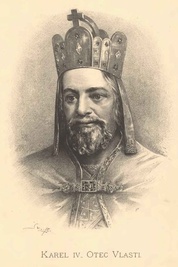
Charles IV
Charles IV was one of the most significant European monarchs of all time and was the instigator of an era of great prosperity in the Czech lands. In 1357 he founded the Charles Bridge and in 1344 construction began on the massive cathedral of St. Vitus (which wasn’t entirely complete until 1929), Charles also founded the New Town in Prague. In a poll organized in 2005 he was elected the “Greatest Czech of All Times.”
In his youth, Charles IV somewhat resembled his father, John of Bohemia, and like his father he “suffered” an interest in jousting and enjoyed the company of women. It is said that during the time of his exuberant youth in the lordship of Lucca (Italy), an attempt was made to poison him. Rumor has it that the author was the husband of one of the Parma signoras, who had made him a cuckold with her royal lover. It is more likely, however, that the attempted poisoning was a politically motivated act. Even in later years Charles indulged in knightly pursuits. On one occasion he injured his spine during a joust and was never able to straighten up properly again, thus causing the end of his knightly pastimes. Charles’s second wife, the proud and beautiful Anna of the Palatinate, took great offense to her husband’s slight disfigurement and it significantly influenced their relationship (soon after that however, Anna broke her neck while furiously riding her horse – the question is whether it was an accident or a suicide).
Charles was the son of the proud Premyslids, Elisabeth and John of Bohemia. The rift between his parents led to the separation of young Wenceslas from his mother (his original name was Wenceslas, he received the name Charles when he was confirmed by his godfather, the King of France). Another consequence was that in 1323 he was sent to be raised at the French princely court, where he married the young Blanche de Valois.
In the years 1331-1333 he acted as his father’s representative during the wild political adventure of the house of
Luxemburg in the Italian lordship of Lucca, where on hot ground he received his first battle scars. In 1333 after a long absence he returned to his native Bohemia and became Moravian margrave, the nobles even prompted his election as vice-governor due to his father’s frequent absences. In 1342, his elegant friend Pierre became Pope Clemens VI and Charles became the Curia’s favorite candidate to become Roman Emperor, against Louis of Bavaria of the Wittelsbach dynasty.
In 1346, Charles received the majority of the electors’ votes, became Roman anti-king and prepared to fight against Louis of Bavaria. But a struck of destiny caused Louis to break his neck while hunting bears in 1347. Charles became the only uncontested ruler of the Holy Roman Empire in 1349.
He also became King of Bohemia after the death of his father and ordered the manufacture of the Czech crown jewels. In 1348 he initiated common meetings of the Imperial and the Bohemian assemblies and also conferred immunity from secular interferences to the Charles University (founded in 1347).
Charles promoted Prague’s development and transformed it into the Empire’s capital city. He also brought extraordinary prosperity to the country, which recalled the time of the old Premyslid kings.
In 1355, Charles rode to Rome with his third wife Anna of Schweidnitz and was at last crowned Roman Emperor. He endeavored to strengthen the universality of the whole Holy Roman Empire, which is why he promulgated the Golden Bull where he regulated the number of religious and secular imperial electors.
In the 1360’s, Charles focused on the expansion of his territory towards the Brandenburg’s lands, while yearningly hoping for a successor. A son was, Wenceslas, finally born in 1361 and was pampered from an early age as the future king. It caused numerous future problems, mainly in combination to Wenceslas’ much weaker single-minded attitude.
When Charles died in 1378, the whole country rang with death knells and laments.




